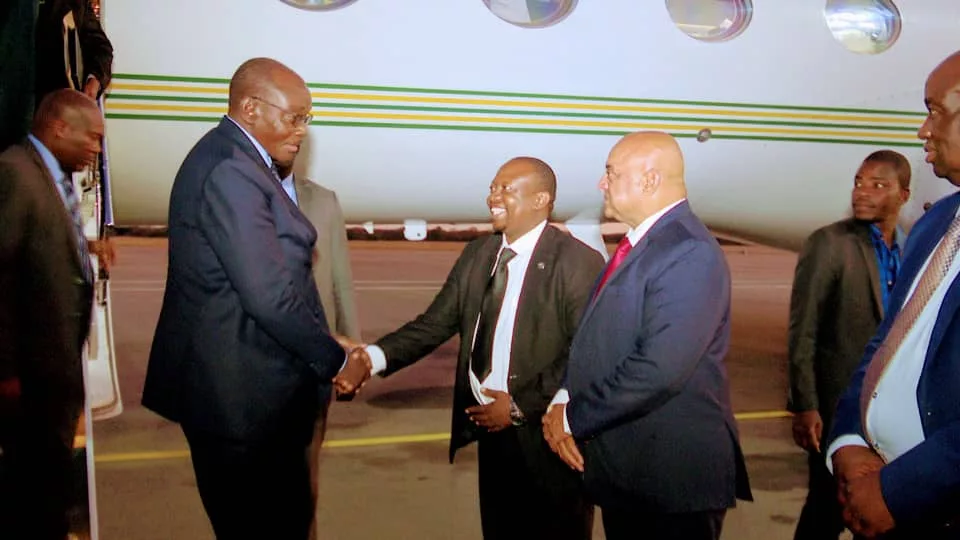|
Getting your Trinity Audio player ready...
|
Staff reporter
Victoria Falls, Zimbabwe – The Zimbabwe Institute of Strategic Thinking (ZIST)’s mid-year stakeholders’ conference was officially launched in a grand ceremony by Vice President Kembo Mohadi.
The conference, themed “Priming of all strategic institutions towards the delivery of Vision 2030,” aims to unite key players from various sectors to discuss and strategize on the national development goals outlined in Vision 2030.
With an electrifying atmosphere of enthusiasm and determination, the conference is being attended by key stakeholders from all strategic institutions in the country. Government officials, business leaders, academics, and civil society representatives have converged in Victoria Falls, ready to collaborate and contribute to the realization of Vision 2030.
Vice President Kembo Mohadi emphasized the importance of collaboration in achieving Vision 2030, stating, “It is key to emphasize that the realization of Vision 2030 largely depends on the effective implementation of our short and medium-term National Development Plans, such as the NDS 1, which serves as our road to the attainment of Vision 2030. In this regard, the onus is upon all stakeholders, including the Government, private sector, cooperating partners, and civil society to collaborate and work very closely together with a unity of purpose.”
The conference agenda has been meticulously designed to address the core areas necessary for the successful implementation of Vision 2030. These areas include setting economic and development targets, priming strategic institutions, developing benchmarks of progressive developments, conducting institutional reviews, and focusing on effective resource utilization towards organizational objectives. Additionally, there will be discussions on fostering collaboration among economic players and formulating clear short and long-term plans.
One of the primary objectives of the conference is to establish clear economic and development targets that will guide stakeholders in their efforts to achieve Vision 2030. This involves strategic planning to identify specific goals and outline the necessary steps to reach them. By doing so, stakeholders will be able to measure their progress and allocate resources efficiently to the areas that require the most attention.
Speaking at the official launch of the conference, ZIST CEO Dr. Tinashe Muzamhindo said: “This conference serves as a catalyst for change, a crucible where ideas are forged into actionable plans, where strategies are honed, and where the seeds of progress are sown.
We have carefully crafted an agenda that encompasses all strategic areas necessary for the successful implementation of Vision 2030. From setting economic and development targets to reviewing and fine-tuning the mandates of our institutions, from developing benchmarks of progressive developments to exploring innovative approaches to resource utilization – every aspect has been meticulously considered”.
He added: “It is not merely about setting targets or developing strategies; it is about the collective commitment to the betterment of our nation. It is about embracing collaboration in its truest form, where diverse perspectives merge, where expertise is shared, and where the power of unity propels us towards our shared vision.”
The conference aims to prime all strategic institutions towards the goals set by Vision 2030. This includes reviewing the mandates and responsibilities of these institutions, and ensuring alignment with the national development agenda. Through this process, stakeholders will be able to identify any gaps or areas for improvement, allowing for more streamlined and effective operations.
Developing benchmarks for progressive developments is another critical aspect of the conference agenda. By establishing clear benchmarks, stakeholders will have a foundation for measuring progress and identifying areas that may require further attention. This will facilitate tracking the implementation of strategic initiatives and enable necessary adjustments to ensure successful outcomes.
The conference will also focus on exploring innovative approaches to resource utilization, including collaboration opportunities among economic players. By sharing best practices and experiences, stakeholders can collectively find solutions to challenges and optimize the use of available resources.
The conference will underscore the significance of clear short and long-term planning. Stakeholders will engage in discussions on effective planning strategies to ensure that goals are not only achievable but also sustainable. This will involve considering potential risks, identifying opportunities, and devising strategies to overcome obstacles.
The ZIST Conference marks a significant milestone in Zimbabwe’s journey towards Vision 2030. With a comprehensive agenda encompassing all strategic areas, this conference sets the stage for collaboration, innovation, and progress.
As Vice President Kembo Mohadi concludes, “I commend the organizers of the ZIST conference for putting together this strategic engagement event that presents itself as an invaluable, tremendous, and remarkable initiative poised to add so much value towards the attainment of Vision 2030. It provides a critical platform for dialogue amongst economic players and strategic institutions designed to build a durable and prosperous Zimbabwe. It provides an invaluable opportunity to forge partnerships, thereby removing the “Them-and-Us Syndrome” as well as the retrogressive silo mentality”.






